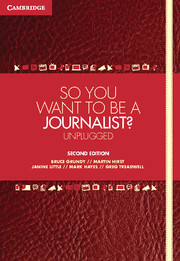Book contents
- Frontmatter
- Contents
- About the authors
- Preface to the second edition
- Acknowledgements
- Acknowledgements for the second edition
- Introduction Journalism unplugged
- Part 1 DISCOVERING JOURNALISM
- Part 2 FINDING AND UNDERSTANDING NEWS
- Part 3 NEWS-WRITING ACROSS THE GENRES
- Part 4 Legal and ethical issues
- 10 Journalism and the law
- 11 Dealing with defamation – everyone has the right to reputation
- 12 Some thoughts about ethics today
- 13 Regulating journalism
- 14 The meaning of professional in journalism
- References
- Index
12 - Some thoughts about ethics today
from Part 4 - Legal and ethical issues
Published online by Cambridge University Press: 05 October 2012
- Frontmatter
- Contents
- About the authors
- Preface to the second edition
- Acknowledgements
- Acknowledgements for the second edition
- Introduction Journalism unplugged
- Part 1 DISCOVERING JOURNALISM
- Part 2 FINDING AND UNDERSTANDING NEWS
- Part 3 NEWS-WRITING ACROSS THE GENRES
- Part 4 Legal and ethical issues
- 10 Journalism and the law
- 11 Dealing with defamation – everyone has the right to reputation
- 12 Some thoughts about ethics today
- 13 Regulating journalism
- 14 The meaning of professional in journalism
- References
- Index
Summary
Chapter objectives
After reading this chapter, you should have an understanding of basic ethical issues and some knowledge of how to resolve ethical dilemmas. In particular, the chapter should help you with the following:
Identifying individuals and groups who have a professional or public stake in journalism ethics
Observing and understanding some of the ethical traditions of thought that might assist the working journalist with ethical decision-making
Understanding professional standards in the context of the media practitioner’s present and future work environment
Understanding the pressures that impact on ethical decision-making in a social and news context
This chapter is an introduction to dealing with ethical issues. Every day in every journalism class, and certainly every day in the newsroom, you will be confronted with decisions that require some degree of thinking about media ethics. Some are simple and straightforward; others may embroil you in hours, days or even weeks of discussion. Some may seem irresolvable. It can never hurt to invest some time reading a comprehensive book about journalism ethics.
- Type
- Chapter
- Information
- So You Want To Be A Journalist?Unplugged, pp. 245 - 261Publisher: Cambridge University PressPrint publication year: 2012



